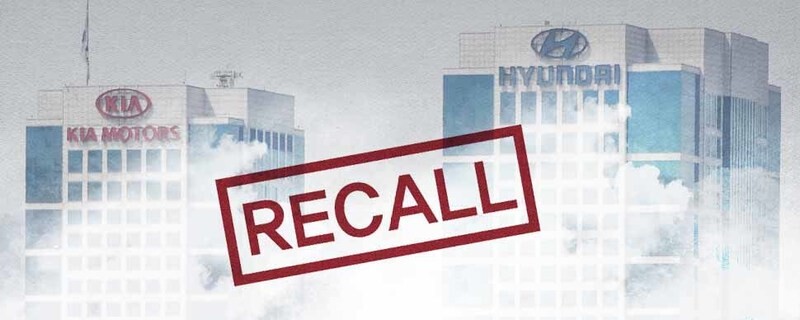hankyoreh
Links to other country sites 다른 나라 사이트 링크
Hyundai and Kia announce belated recall of 170,000 vehicles with Theta 2 engines

Hyundai and Kia Motors plan to recall 170,000 vehicles from five models, including their Grandeur and Sonata, after acknowledging a defect in the Theta 2 engines used in them.
While the two automakers said the recall was a voluntary measure following reporting to the Ministry of Land, Infrastructure and Transport (MOLIT), it could be that the move is a belated gesture, with the ministry having already decided on a recall and preparing to announce the results of the defect study and a recall having already been carried out in the US.
MOLIT announced on Apr. 7 that a voluntary recall by Hyundai Motor was being carried out for 171,348 vehicles from five Hyundai and Kia models, including the Grandeur (HG), Sonata (YG), K7 (VG), K5 (TF), and Sportage (SL). The recalls apply to vehicles with Theta 2 engines produced before Aug. 2013, which include 112,670 Grandeurs, 6,092 Sonatas, 34,153 K7s, 13,032 K5s, and 5,401 and Sportages. The recall is scheduled to begin on May 22.
The recall will be the third largest in South Korean history. It’s also the first case of all models with a particular engine being recalled in the history of South Korean automobiles.
MOLIT previously launched an investigation into possible manufacturing defects last October after continued reports of Hyundai and Kia models with the Theta 2 engine stalling during operation due to engine seizure, a phenomenon in which a contact surface sticks due to frictional heat. The study showed the seizures occurred because of metal debris appearing during production of oil supply holes in the Theta 2 engine’s crankshaft. Engine seizure can result in severe engine noise and stalling or fires while driving. The engines in question were produced at Hyundai and Kia’s engine factory in Hwaseong, Gyeonggi Province.
While the recall is ostensibly voluntary, it could actually be a mandatory move. After its initial launch in 2007, an improved version of the Theta 2 engine was released in 2009, but complaints of severe engine noise and stalling have been emerging for the past several years.
In a sense, Hyundai and Kia have been slow in waiting until now to acknowledge the engine defects in their major models. The defect in the Theta 2 engine has been cited for several years now, and a massive recall was carried out in the US in Sept. 2015. A Hyundai employee blew the whistle on the issue last year.
Stressing the voluntary nature of its decision, Hyundai and Kia explained that the recalls in the US and South Korea “had different causes for the defects.” But with MOLIT having made a recall decision just before announcing its defect investigation findings and a recall already performed in the US, criticisms of being slow to act appear inevitable.
Hyundai’s 2015 recall of vehicles with Theta 2 engines in the US was also due to issues of metal debris in the engine. But while the automaker recalled 470,000 Sonata (YF) vehicles in the US at the time, it has argued that its Theta 2 engine vehicles produced in South Korea were not subject to the recall.
Hyundai Motor also said it was in discussions on whether to carry out a recall in connection with additional Theta 2 engine defects reported in North America. The cause is believed to be issues with an unevenly processed crankshaft pin surface. The move would apply to 1.3 million vehicles from five models: the Sonata (Yfa), Santa Fe (AN), K5 (QF), Sorento (XMa), and Sportage (SL).
By Hong Dae-seon, staff reporter
Please direct questions or comments to [english@hani.co.kr]

Editorial・opinion
![[Column] Season 2 of special prosecutor probe may be coming to Korea soon [Column] Season 2 of special prosecutor probe may be coming to Korea soon](https://flexible.img.hani.co.kr/flexible/normal/500/300/imgdb/original/2024/0426/3317141030699447.jpg) [Column] Season 2 of special prosecutor probe may be coming to Korea soon
[Column] Season 2 of special prosecutor probe may be coming to Korea soon![[Column] Park Geun-hye déjà vu in Yoon Suk-yeol [Column] Park Geun-hye déjà vu in Yoon Suk-yeol](https://flexible.img.hani.co.kr/flexible/normal/500/300/imgdb/original/2024/0424/651713945113788.jpg) [Column] Park Geun-hye déjà vu in Yoon Suk-yeol
[Column] Park Geun-hye déjà vu in Yoon Suk-yeol- [Editorial] New weight of N. Korea’s nuclear threats makes dialogue all the more urgent
- [Guest essay] The real reason Korea’s new right wants to dub Rhee a founding father
- [Column] ‘Choson’: Is it time we start referring to N. Korea in its own terms?
- [Editorial] Japan’s rewriting of history with Korea has gone too far
- [Column] The president’s questionable capacity for dialogue
- [Column] Are chaebol firms just pizza pies for families to divvy up as they please?
- [Column] Has Korea, too, crossed the Rubicon on China?
- [Correspondent’s column] In Japan’s alliance with US, echoes of its past alliances with UK
Most viewed articles
- 1The dream K-drama boyfriend stealing hearts and screens in Japan
- 2‘We must say no’: Seoul defense chief on Korean, USFK involvement in hypothetical Taiwan crisis
- 3[Column] Can we finally put to bed the theory that Sewol ferry crashed into a submarine?
- 4[Editorial] Yoon cries wolf of political attacks amid criticism over Tokyo summit
- 5AI is catching up with humans at a ‘shocking’ rate
- 6S. Korea “monitoring developments” after report of secret Chinese police station in Seoul
- 7Doubts remain over whether Yoon will get his money out of trip to Japan
- 8[Photo] “Comfort woman” survivor calls on president to fulfill promises
- 9[Editorial] Was justice served in acquittal of Samsung’s Lee Jae-yong?
- 101 in 5 unwed Korean women want child-free life, study shows